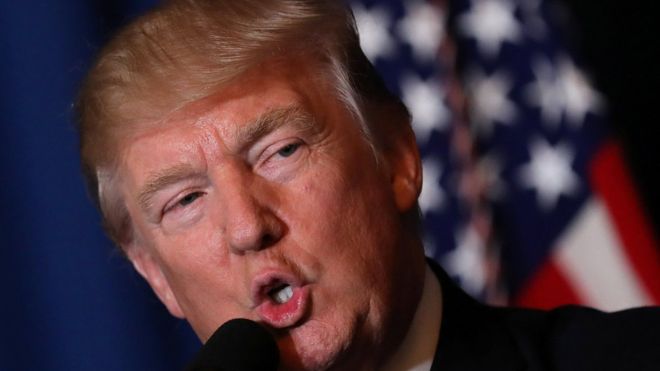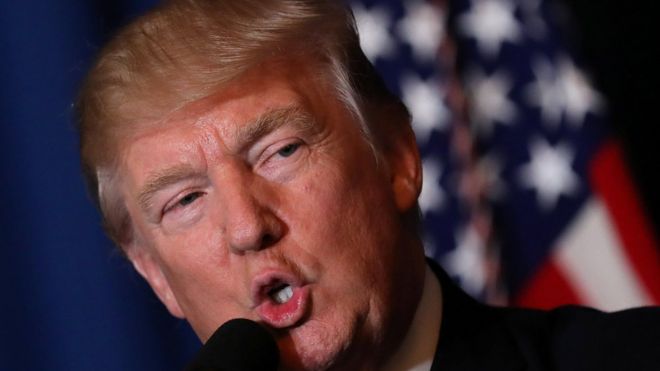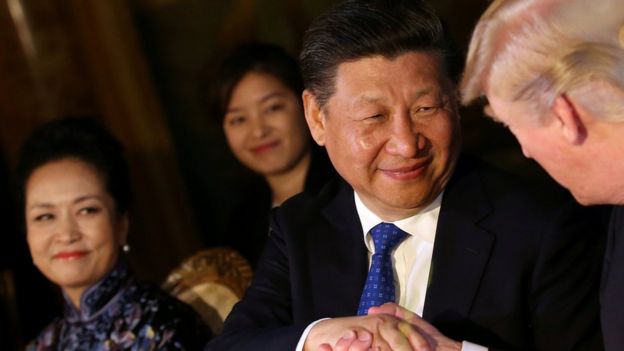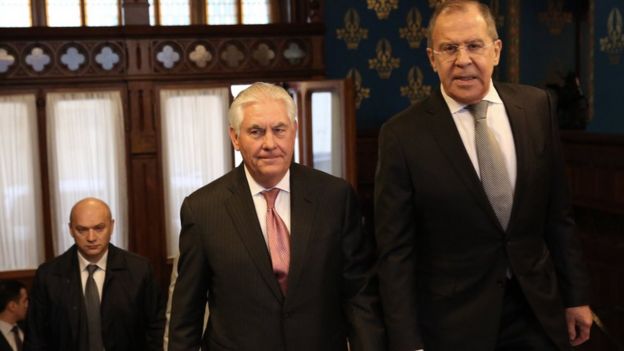

Donald Trump has not only normalised American foreign policy, he has arguably made it more effective.
With two high-profile, signal-sending bombing raids and a series of breathtaking policy reversals, President Trump has brought US foreign policy back in line with conventional thinking. But he has added to the equation a measure of force that gives Washington new clout.
When policy shifts so dramatically and with such little explanation, it can obviously shift again.
So we don’t know how long the new positions will last. Nato could be back out of favour, Putin back in, simply with a couple of 140 character tweets.
But Donald Trump is a voracious consumer of cable television and the hunch is he will like the near-universal praise he’s been getting on US talk shows this week.
There are clearly glaring inconsistencies in his new foreign policies – he bombs a Syrian air base because of the suffering of Syrian babies, but bans Syrian refugees from entering America.
There are pitfalls too. His switch on China appears largely based on a good rapport with Xi Jinping in Mar-a-Lago, but China still has interests which are not in sync with America’s – its expansion in the South China Seas is just one.
 Image copyrightREUTERS
Image copyrightREUTERSBut, as one Republicans put it to me this week, Mr Trump has begun to know what he doesn’t know. That’s important. He has begun to understand that the world is more complicated than he thought.
You can laugh all you like at the sight of Mr Trump getting so publicly tutored on China, North Korea, the Export-Import bank and currency manipulation. Of course it was foolish to promise simple solutions to complex problems. But it’s better to learn now how difficult those things are than never to learn at all.
- One dizzying day of Trump U-turns
His recent praise of Nato and rejection of Moscow immediately put this White House more in sync with European allies.
Europe has long believed that the real threat to global security comes from Russia, not China. That’s not what millions of Mr Trump’s voters believe. He will have to keep them in mind as he backs away from calling China a currency manipulator and slapping it with tariffs, as he had promised he would do in the campaign.
But the shifts do bring America back into the foreign policy mainstream.
The use of force, in Syria and Afghanistan, meanwhile, sends the message to America’s adversaries that Mr Trump is not as war-averse as his predecessor.
The White House was delighted that Xi Jinping got to hear the news, over dessert in Mar-a-Lago, that the US had bombed Syria. They wanted him to get the message that there’s a new sheriff in town – and ideally to pass that message on to their contacts in Pyongyang.
Those Tomahawks launched against the Shayrat air base didn’t really do much to limit Syria’s military capability, but they did send several effective signals to Syria and its friends.
First, using chemical weapons against civilians will have consequences. Second, this is a president who is prepared to use force fast and with no warning – Trump isn’t paralysed by analysis which was the criticism of Barack Obama.
Third, and perhaps more critical, it gave Secretary of State Rex Tillerson a large stick to pack in his luggage for his trip to Moscow.
- Syrian American responds to Trump and Assad
- What is Trump’s plan in Syria?
- How North Korea is testing the US
Mr Obama’s secretary of state, John Kerry, negotiated over Syria for years with no leverage because the Russians knew his boss wouldn’t sanction the use of force – not so anymore.
There was similar messaging printed on that massive bomb dropped on suspected Islamic State militants in Afghanistan this week. Dropping a big bomb is one thing, but you get a lot more attention when that bomb is rather gruesomely nicknamed “the mother of all bombs”.
It wasn’t just a bomb, it was the biggest conventional weapon ever used in combat. It was positively Trumpian.
That MOAB also sent signals. Mr Trump told his supporters during the campaign that his number one foreign policy priority was defeating so-called Islamic State. Some of those voters were not thrilled then that his first military intervention was in response to the suffering of Syrian children.
They are suspicious of America getting dragged into more Middle East conflicts that don’t help US interests. Bombing IS was a reminder that Mr Trump is focused on what he calls America’s number one national security challenge.
 Image copyrightEPA
Image copyrightEPAAhead of the Easter weekend, with North Korea rumbling about a nuclear test, the Afghan strike may also have served as another reminder to Pyongyang that Mr Trump has big, bunker-busting weapons and will use them.
So, in two short weeks, and with a new more professional team in the White House, Mr Trump has stabilised foreign policy. Allies will wait to see if the change lasts and who really speaks for the president. But for the moment there is a collective sigh of relief that American leadership may be back in more conventional hands.
Very soon, the focus will shift back to domestic policy and there Mr Trump has more of challenge. He needs a legislative win fast. When Congress returns in a week, he will tackle health care, again, tax reform and he faces a government shutdown over America’s debt limit. Failure on those will quickly shift the tone of the TV commentators.
President Trump has no domestic equivalent of the confident, competent General H R McMaster, his new national security adviser.
The Republican party is divided and the conservative wing has already shown it is prepared to say no to the president. Democrats, having been berated on Twitter and on TV by Mr Trump, are now in no mood to abandon their angry liberal base and work with him.
Mr Trump has had a good couple of weeks. He has shown a capacity to learn and adapt as a result. He has begun to understand what he doesn’t know and he has marginalised the more populist members of his team.
He wants successes. It is easier for him to get them on the world stage than at home – it would be ironic if America’s isolationist president now decided to become a foreign policy president because that’s where the wins are.
[Source:-BBC]




